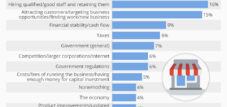Global competition: The varying influence of SMEs and their challenges in competing with state giants
Language selection 📢
Published on: March 19, 2024 / Update from: March 24, 2024 - Author: Konrad Wolfenstein

SMEs: core parts of the economy and their different roles in different countries - Image: Xpert.Digital
🌟🏢 The vital role of small and medium-sized businesses in the global economy
🌐 Small and medium-sized enterprises (SMEs) are the backbone of most national economies worldwide, including Germany. These companies, defined by their number of employees and their annual turnover, are crucial for employment, innovation and the social fabric of a society. However, their role, importance and the support they receive from government vary greatly from country to country. These differences shed light on the complexity of global economic systems and the challenges that SMEs face in different geopolitical contexts.
“Small and medium -sized companies (SMEs) play an important role worldwide in almost every national economic system. However, a differentiated view of other countries is required compared to Germany. ”
👥💼 Germany is characterized by a strong middle class that is widely recognized as the engine of the economy and innovation. In Germany we find comprehensive support for SMEs through government programs, concessional loans, research funding and export assistance, which is due to the close networking between industry, science and government. German SMEs, often referred to as “hidden champions”, are global market leaders in specialized niche markets and play a central role in the country's export economy.
“The influence and support of the government and its international competitiveness varies significantly from country to country. There are countries in which large companies and state companies play a more dominant role than in Germany. In such countries, the proportion of SMEs in the overall economy, employment and innovative strength can be relatively lower. ”
👓 In contrast, there are countries in which large, often state-owned companies or private corporations dominate the economy. A look at different countries illustrates the differences and the resulting consequences for SMEs:
📊 1. China
In China, state-owned enterprises (SOEs) and large private companies play a dominant role in the economy, particularly in key sectors such as energy, telecommunications and finance. The government strategically relies on these companies to achieve national economic goals, which creates an influential position over smaller competitors. Although SMEs also play an important economic and social role in China, they often face challenges such as limited access to finance and markets, which are reinforced by preferential policies in favor of large companies.
⚒️ 2. Russia
In Russia, it is primarily the large companies and state-owned corporations in the energy and raw materials sector that take precedence. Their ties to the government strengthen their position and make competition more difficult for SMEs. This concentration on large companies affects the diversity of the economy and limits the innovation and flexibility that typically come from a healthy SME sector.
🌐 3 United Arab Emirates (UAE) and Gulf States
In the UAE and other Gulf states, large state-owned companies and international corporations dominate the oil, gas, real estate and financial sectors. Although SMEs exist and are supported, the influence of the large players largely predominates. This results in an economy where diversification and entrepreneurship through SMEs is less visible.
🏢 4. South Korea
Large conglomerates known as chaebols (e.g. Samsung, Hyundai) dominate the South Korean economy. Their power and extensive government support create a challenging environment for SMEs, as large companies hold a near-monopoly position in many areas of the economy. Despite government efforts to strengthen small and medium-sized businesses, competitiveness for SMEs remains a challenge.
🔄 Differences between other countries and Germany
The differences between these countries and Germany in terms of the role and support of SMEs illustrate how geopolitical, social and economic conditions can influence the development and growth of small and medium-sized companies. While Germany has a comprehensive support system for SMEs that promotes their international competitiveness, SMEs in other countries often face greater challenges. These include access to finance, political and administrative hurdles and increased competition from large, often state-backed companies.
Global differences show that, although SMEs play a fundamental role everywhere, their ability to innovate, grow and make a significant contribution to a country's economy depends heavily on national conditions. It highlights the need to understand the unique situation of SMEs in different country contexts and to develop specific strategies to promote and support their development.
📣 Similar topics
- 🌏 Global comparison: The role of SMEs in the global economy
- 🇩🇪 Germany's middle class: backbone of the economy
- 🏭 Innovation through SMEs: Secret of success of the hidden champions
- ⚖️ Economic power of the chaebols: challenges for SMEs in South Korea
- 🌐 Government support for SMEs: An international overview
- 🚀 World export champion: How German SMEs are conquering the global market
- 💼 Large corporations vs. SMEs: competitive conditions worldwide
- 💡 Promoting innovation: The key to success for SMEs
- 🔍 SMEs in China and Russia: Overcoming market entry barriers
- 🌟 Learning from hidden champions: success strategies of German SMEs
#️⃣ Hashtags: #SME #SME #Innovation #Global Economy #Corporate Promotion
🎯🎯🎯 Benefit from Xpert.Digital's extensive, fivefold expertise in a comprehensive service package | R&D, XR, PR & SEM

AI & XR 3D Rendering Machine: Fivefold expertise from Xpert.Digital in a comprehensive service package, R&D XR, PR & SEM - Image: Xpert.Digital
Xpert.Digital has in-depth knowledge of various industries. This allows us to develop tailor-made strategies that are tailored precisely to the requirements and challenges of your specific market segment. By continually analyzing market trends and following industry developments, we can act with foresight and offer innovative solutions. Through the combination of experience and knowledge, we generate added value and give our customers a decisive competitive advantage.
More about it here:
🏭 Germany is a country of SMEs, hidden champions 💖 Heart and innovation from the middle, the middle class 🛠️🇩🇪
Germany, often referred to as the land of engineers and poets, owes its economic success and innovation to a sector that may be underestimated in other countries: small and medium-sized enterprises (SMEs), also known as Mittelstand. These companies are the unshakable foundation on which the German economy is built and from which it is supported to a degree that is hardly comparable in many other countries.
More about it here:

We are there for you - advice - planning - implementation - project management
☑️ Industry expert, here with his own Xpert.Digital industry hub with over 2,500 specialist articles
I would be happy to serve as your personal advisor.
You can contact me by filling out the contact form below or simply call me on +49 89 89 674 804 (Munich) .
I'm looking forward to our joint project.
Xpert.Digital - Konrad Wolfenstein
Xpert.Digital is a hub for industry with a focus on digitalization, mechanical engineering, logistics/intralogistics and photovoltaics.
With our 360° business development solution, we support well-known companies from new business to after sales.
Market intelligence, smarketing, marketing automation, content development, PR, mail campaigns, personalized social media and lead nurturing are part of our digital tools.
You can find out more at: www.xpert.digital - www.xpert.solar - www.xpert.plus


























